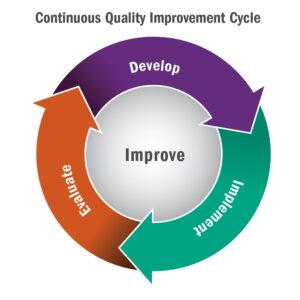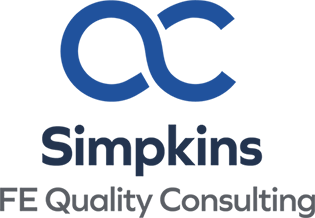
Enhancing Further Education Quality: Crafting an Effective Self-Assessment Report and Impactful Quality Improvement Plan
As the academic year draws to a close, it is a critical time for further education providers to reflect on their performance and identify areas for growth and improvement. One indispensable tool in this process is the self-assessment report (SAR), which serves as a foundation for developing a comprehensive quality improvement plan (QIP). As a further education quality consultant, I specialise in scrutinising self-assessment reports and quality improvement plans to ensure their effectiveness and impact. In this blog, we will delve into the key elements of writing a robust self-assessment report and explore how it connects to the creation of an engaging quality improvement plan.
Understanding the Self-Assessment Report:
A self-assessment report is a thorough evaluation of an educational institution’s strengths, weaknesses, opportunities, and threats. It provides a holistic overview of the organisation’s performance, with a focus on quality. To craft an effective self-assessment report, follow these essential steps:
a. Self-Assessment is not just up to Quality: It is not just the Quality Lead in the institution to write the self-assessment report. It’s critical that everyone in the business contributes in reflecting on the last academic year. This should be done at regular intervals through-out the year, however, it is most important before starting to write the report. Be creative in gathering feedback from all staff, perhaps in the form of a survey, or as part of a organisational development day/exercise, where you can capture information on how your colleagues see your strengths and areas of improvement.
b. Gathering Evidence: Collect data from various sources, such as learner/employer feedback, staff surveys, observation records, and achievement data. Ensure that the evidence covers different aspects of the institution, including teaching and learning, learner support, resources, and leadership.
c. Analysis and Reflection: Analyse the collected evidence to identify patterns, trends, and areas for improvement. Reflect on the outcomes of the analysis and determine the underlying factors contributing to both successes and challenges. Be very clear on what your key strengths and areas of improvement are.
d. Setting Priorities: Prioritise the areas for improvement based on their significance and impact on the overall quality.
e. Structure: It’s important that your SAR isn’t too short, or too long. Around the 10-15 pages should suffice. You finished SAR should be branded, have an overall introduction to your provision, your own gradings/judgements of your business (aligned to Ofsted’s EIF outcomes), key data, strengths and areas of improvement. It’s useful to add testimonials from learners and employers too.
 Crafting an Engaging Quality Improvement Plan:
Crafting an Engaging Quality Improvement Plan:
A quality improvement plan builds upon the findings and priorities identified in the self-assessment report. It outlines the actions, strategies, and resources required to address the identified areas for improvement. To create a plan that is impactful and engaging, consider the following aspects:
a. Clear Objectives: Clearly articulate the objectives of the plan, aligning them with the overall mission and vision of the institution. Ensure that the objectives are realistic, specific, and measurable to provide a clear roadmap for improvement. It’s useful to ‘map’ them to Ofsted EIF outcomes and therefore, where they sit within your SAR. Have one owner per objective: This does not mean they have to do all the work towards it, but they are accountable for it’s progress.
b. Actionable Steps: Break down the objectives into actionable steps, outlining the tasks, responsibilities, timelines, and required resources. This allows for effective implementation and ensures accountability.
c. Collaboration and Engagement: Encourage collaboration and involvement from staff members, learners, and relevant stakeholders throughout the improvement process. Foster a culture of shared ownership and engagement, as this contributes to the plan’s success.
d. Monitoring and Evaluation: Develop a robust monitoring and evaluation framework to assess the progress and impact of the quality improvement plan. Regularly review the plan’s effectiveness, make adjustments as needed, and celebrate achievements to maintain motivation and momentum.
How I can help:
As a further education quality consultant, I provide invaluable assistance in scrutinising self-assessment reports and quality improvement plans. By leveraging my expertise and experience, I can help institutions:
a. Ensure Rigor and Accuracy: I meticulously review self-assessment reports, identifying any gaps or areas that require further exploration. My objective perspective ensures that the report meets the highest standards of rigor and accuracy.
b. Enhance Relevance and Focus: I assist in aligning the self-assessment report and quality improvement plan with the institution’s specific context and strategic priorities. This ensures that the resulting plan is tailored to the institution’s unique needs.
c. Foster Impactful Strategies: Drawing on my knowledge of best practices and trends in further education, I offer insights and recommendations for developing impactful strategies within the quality improvement plan. These strategies promote sustainable change and elevate the institution’s overall quality.
d. If I already working with you as a client as part of your governance arrangements, I can approve the SAR before you share it with Ofsted in January.
Writing a comprehensive self-assessment report and creating an engaging quality improvement plan are integral steps for further education providers seeking to enhance their quality. As a further education quality consultant, I can assist in scrutinising these essential documents, ensuring their effectiveness and alignment with institutional goals. By leveraging my expertise, institutions can confidently embark on a journey of improvement and ensure a brighter future for their learner, staff, and stakeholders. Reach out to me for expert guidance and support in this crucial process. Together, let’s elevate the quality of further education.







